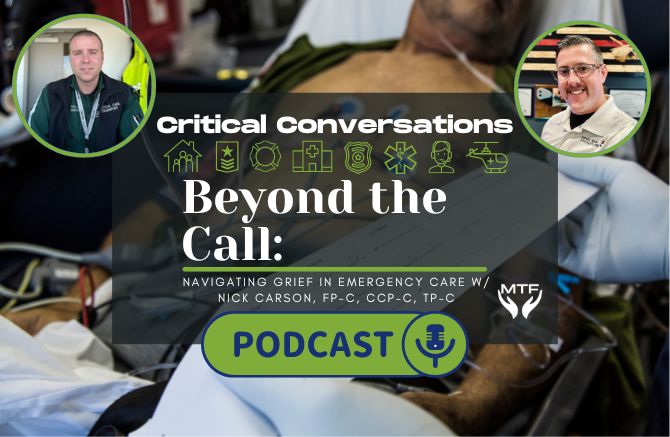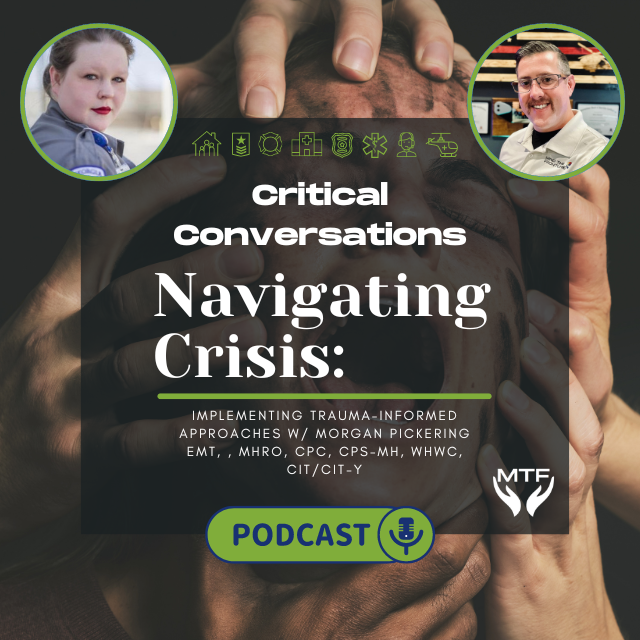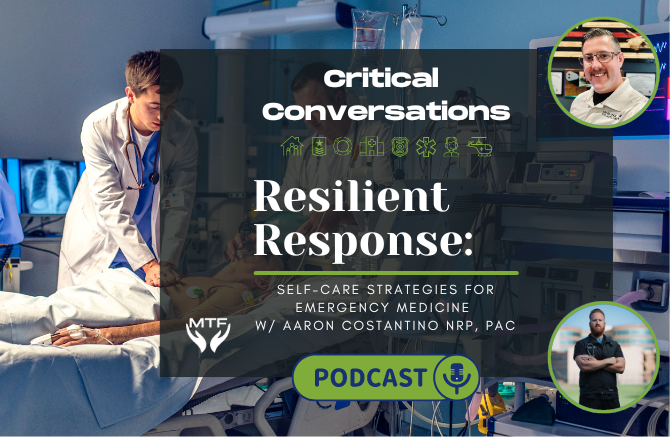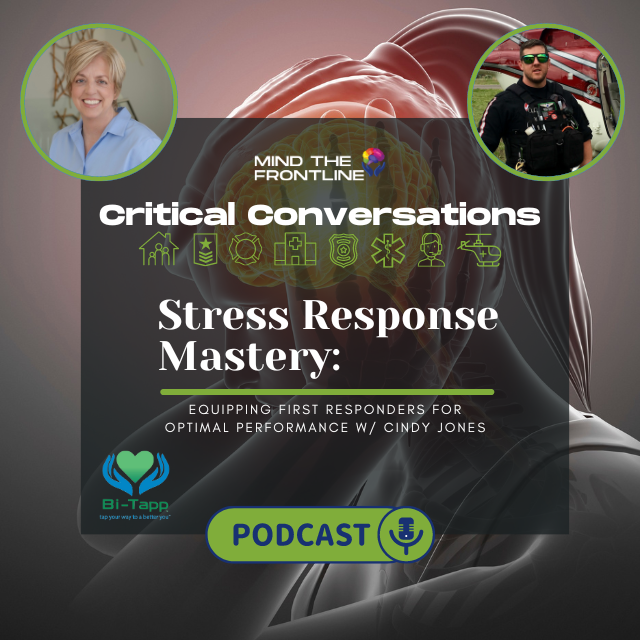Navigating Crisis: Implementing Trauma-Informed Approaches
Explore the importance of trauma-informed approaches in crisis management for veterans and first responders.
5 min read
 Chris Smetana, AS, FP-C, CCP-C, NRP | Founder/President
:
Jul 24, 2024
Chris Smetana, AS, FP-C, CCP-C, NRP | Founder/President
:
Jul 24, 2024

Explore the delicate balance of handling grief and loss in emergency care settings, where compassion meets clinical expertise.
The emotional toll of losing a patient in an emergency care setting cannot be understated. Healthcare providers who witness death firsthand often find themselves grappling with a mix of intense emotions, ranging from sorrow and helplessness to guilt and even trauma. The weight of these experiences can manifest in various psychological challenges, leaving providers vulnerable to conditions like post-traumatic stress disorder (PTSD), depression, and anxiety.
Studies, such as the one published in the Journal of Emergency Medicine, shed light on the heightened risk that emergency medical professionals face when repeatedly confronted with patient deaths. This stark reality underscores the critical need to not only recognize but actively address the profound emotional impact that patient loss can have on healthcare providers. By acknowledging and validating these feelings, healthcare organizations can better support their staff in navigating the complex terrain of grief and loss within the demanding context of emergency care.

In addition to colleagues, supervisors, mental health professionals, and friends and family, another crucial component of a strong support network for healthcare providers dealing with patient deaths is peer support groups. These groups offer a unique and valuable space for individuals to connect with others who understand the challenges they face firsthand. By sharing their experiences, emotions, and coping strategies within a group of peers who can truly empathize, healthcare providers can find comfort, validation, and a sense of solidarity in their shared experiences of grief and loss.
Peer support groups provide a non-judgmental environment where healthcare providers can openly discuss their feelings, fears, and uncertainties without the fear of stigma or misunderstanding. Through these connections, individuals can gain valuable insights, perspectives, and coping mechanisms from others who have walked a similar path. This sense of community and understanding can be incredibly empowering and healing, helping healthcare providers navigate the emotional complexities of their work with resilience and compassion. By fostering a culture of peer support within emergency care settings, organizations can further enhance the well-being and emotional resilience of their staff, ultimately improving patient care and outcomes. Mind the Frontline offers a weekly online Peer Support group. For more information, click on the HERE
-Jul-22-2024-11-10-14-8374-PM.png?width=307&height=200&name=Blog%20Section%20Pictures%20(3)-Jul-22-2024-11-10-14-8374-PM.png)
Building resilience is crucial for emergency care professionals to maintain their mental well-being when faced with death in the workplace. Resilience refers to the ability to adapt positively to adversity and bounce back from difficult experiences. In the high-stress environment of emergency care settings, where healthcare providers are constantly exposed to trauma and loss, cultivating resilience is essential for sustaining their emotional health and ability to deliver quality care.
Resilience training goes beyond just providing coping mechanisms for dealing with the emotional impact of patient deaths. It also focuses on enhancing skills such as effective communication, conflict resolution, and stress management. By equipping healthcare providers with a toolkit of resilience-building techniques, they can not only navigate the challenges of their work with more ease but also strengthen their overall well-being.
Furthermore, resilience training empowers emergency care professionals to develop a proactive approach to self-care. This may involve incorporating mindfulness practices, regular exercise, and healthy lifestyle habits into their daily routines. By prioritizing their own mental and physical well-being, healthcare providers can better cope with the emotional demands of their job and continue to provide compassionate care to those in need.
Ultimately, fostering resilience among emergency care professionals is not just about individual well-being but also about creating a culture of support and resilience within healthcare organizations. By investing in resilience training programs and promoting a supportive work environment, organizations can empower their staff to thrive in the face of adversity, ultimately enhancing patient care and outcomes.
-Jul-22-2024-11-10-14-8469-PM.png?width=307&height=200&name=Blog%20Section%20Pictures%20(2)-Jul-22-2024-11-10-14-8469-PM.png)
Navigating the ethical dilemmas surrounding end-of-life care in emergency settings is a profound challenge that healthcare providers face daily. From determining whether to continue resuscitation efforts to deciding on the appropriateness of withholding life-sustaining treatments, these decisions weigh heavily on the shoulders of those in the frontline of care. It is a delicate balance of honoring the wishes of the patient, respecting the desires of their loved ones, and upholding the ethical standards of the healthcare profession.
In the midst of such critical moments, open dialogue and clear communication become paramount. Healthcare providers must engage in compassionate conversations with patients and their families, ensuring that every decision is made with empathy and understanding. By adhering to ethical principles and fostering a culture of respect and dignity, emergency care professionals can navigate these challenging decisions with grace and compassion.
Ultimately, the goal is to provide the best possible care while honoring the wishes and values of the patient. Through thoughtful consideration, ethical reflection, and a commitment to compassionate care, healthcare providers can navigate the complexities of end-of-life decision-making with integrity and humanity.
-Jul-22-2024-11-10-14-9559-PM.png?width=307&height=200&name=Blog%20Section%20Pictures%20(4)-Jul-22-2024-11-10-14-9559-PM.png)
Comprehensive training and education in compassionate care are crucial for equipping first responders with the necessary skills and knowledge to handle patient deaths with sensitivity and empathy. These training programs go beyond just technical skills and dive into the emotional aspects of patient care.
In these programs, first responders learn effective communication techniques to ensure clear and empathetic interactions with patients and their families. They also engage in active listening practices to truly understand the needs and concerns of those they are assisting. Cultural competence training helps them navigate diverse backgrounds and beliefs, ensuring that they provide respectful and inclusive care to all.
Understanding the emotional needs of patients and their families is a key component of compassionate care training. First responders learn how to approach difficult situations with empathy, compassion, and a deep understanding of the emotional impact of their work. By implementing these training programs, first responders can enhance their ability to provide holistic and compassionate care during challenging and emotional times, ultimately improving patient outcomes and overall well-being.
-3.png?width=307&height=200&name=Blog%20Section%20Pictures%20(5)-3.png)

Nick Carson, FP-C, CCP-C, TP-C, NRP, B.S., brings a wealth of experience as a Flight Paramedic at the University of Vermont Health Network. Alongside owning Precision Training, LLC and hosting the Code 321 Podcast, Nick is a renowned national conference speaker focusing on training, safety systems, trauma care, leadership, and active threat response. His expertise extends to authoring various training programs for emergency response agencies and actively contributing to his organization's training committee. With a background in the career fire service, municipal EMS, and critical care medicine, Nick holds a Bachelor's of Science in Public Communications from the University of Vermont.
Explore many valuable First Responder Mental Health and Wellness resources on Mind the Frontline's online platform. Discover the link below to access a wide range of support and information tailored specifically for first responders.
Additional Mind the Frontline Resource's
Stay connected with Mind the Frontline on Facebook & LinkedIn.
$50 off code:frontline40
Empower your employees with Mind Shield for Organizations, a comprehensive membership program designed specifically to support the mental health and wellness of first responders. With memberships ranging from $25 to $45 per employee, Mind Shield offers a suite of resources tailored to enhance the resilience and well-being of those on the front lines.
Key Features and Benefits:
Mind Shield Peer Support LMS™: Equip your peer support team with our Learning Management System, designed to streamline and enhance the delivery of peer support.
On-demand and Virtual Continuing Education: Access a wide range of peer support continuing education options that fit the schedules of busy first responders.
Comprehensive Resource Directory: Utilize the largest online directory of first responder mental health and wellness resources.
State-specific Resources: Easily access mental health, wellness, and recovery resources categorized by state.
24/7 Debrief Hotline: Benefit from around-the-clock support with the MindShield debrief hotline.
Virtual 1-on-1 and Group Support: Engage with virtual peer support, available both one-on-one and in group settings, to provide flexible assistance.
Preferred Provider List and Discounts: Take advantage of a curated list of preferred mental health providers and receive discounts on various mental health resources, including innovative tools like Bi-Tapp.
Educational and Supportive Content: Gain access to weekly blogs, podcasts, videos, healthy recipes, fitness routines, and more to support lifestyle balance and mental wellness.

Explore the importance of trauma-informed approaches in crisis management for veterans and first responders.

Discover effective self-care strategies and team dynamics in emergency medicine to enhance well-being and resilience among first responders.

Mastering Stress Responses: Empowering First Responders for Peak Performance